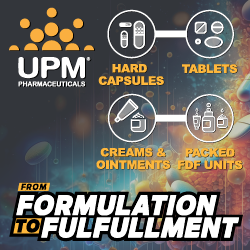TiGenix Receives Positive Feedback From the FDA on Global Phase III Trial Protocol
TiGenix NV, an advanced biopharmaceutical company focused on developing and commercializing novel therapeutics from its proprietary platform of allogeneic stem cells, recently announced it has received positive feedback from the US FDA on an improved protocol for its global Phase III trial for the treatment of complex perianal fistulas in Crohn’s disease patients.
On August 2015, TiGenix received the FDA endorsement of a Special Protocol Assessment (SPA) for a pivotal Phase III study for Biologics License Application (BLA) in the US. Since the granting of the SPA, further confirmatory positive results have been obtained from the European Phase III study of Cx601 (ADMIRE-CD), the largest randomized study performed so far in Crohn’s disease patients with complex perianal fistulas. Subsequently, TiGenix submitted a Marketing Authorization Application to the European Medicines Agency in March 2016. Following the publication of this additional data, TiGenix submitted a series of technical improvements to be considered by the FDA regarding the previously endorsed protocol.
Based on the minutes from a meeting with the FDA on January 19, 2017, the Agency has agreed to an improved protocol for the global Phase III trial of Cx601. With these current amendments, the FDA has agreed that the BLA could be filed based on the efficacy and safety follow-up of patients assessed at week 24, instead of week 52. Furthermore, the FDA has agreed to accept fewer patients than originally planned in the study, and has endorsed a broader target population that will ultimately facilitate the recruitment process. With these adjustments, the study will benefit from an expedited recruitment process that should lead to shorter timelines, an earlier filing, and the possibility of an earlier approval in the US. As a result of these modifications, the trial design is even more similar to the European ADMIRE-CD than it was before.
“We are pleased to have had the opportunity to meet with the FDA and receive the Agency endorsement for our proposals for this improved protocol,” said Dr. Maria Pascual, VP Regulatory Affairs & Corporate Quality of TiGenix. “We continue to be focused and committed to bringing Cx601 to US patients as soon as possible. We believe that this revised protocol will allow us to file for approval one year earlier than we had originally planned,” concluded Dr. Pascual.
The global pivotal Phase III trial for the US registration of Cx601 is expected to begin in the first half of 2017. In parallel, TiGenix is exploring further expedited pathways to accelerate the submission and review process for its future BLA.
TiGenix NV (Euronext Brussels: TIG) is an advanced biopharmaceutical company focused on developing and commercializing novel therapeutics from its proprietary platforms of allogeneic, or donor-derived, expanded stem cells. Our lead product candidate from the adipose-derived stem cell technology platform is Cx601, which is in registration with the European Medicines Agency for the treatment of complex perianal fistulas in Crohn’s disease patients. Our adipose-derived stem cell product candidate Cx611 has completed a Phase I sepsis challenge trial and a Phase I/II trial in rheumatoid arthritis. Effective July 31, 2015, TiGenix acquired Coretherapix, whose lead cellular product candidate, AlloCSC-01, is currently in a Phase II clinical trial in Acute Myocardial Infarction (AMI). In addition, the second product candidate from the cardiac stem cell-based platform acquired from Coretherapix, AlloCSC-02, is being developed in a chronic indication. On July 4, 2016, TiGenix entered into a licensing agreement with Takeda, a large pharmaceutical company active in gastroenterology, under which Takeda acquired the exclusive right to commercialize Cx601 for complex perianal fistulas outside the US. TiGenix is headquartered in Leuven (Belgium) and has operations in Madrid (Spain).
Cx601 is a suspension of allogeneic expanded adipose-derived stem cells (eASC) locally injected. Cx601 is an investigational agent being developed for the treatment of complex perianal fistulas in Crohn’s disease patients with inadequate response to at least one conventional or biologic therapy including antibiotics, immunosuppressants, or anti-TNF agents. Crohn’s disease is a chronic inflammatory disease of the intestine and patients can suffer from complex perianal fistulas for which there is currently no effective treatment. In 2009, the European Commission granted Cx601 orphan designation for the treatment of anal fistulas, recognizing the debilitating nature of the disease and the lack of treatment options. Cx601 has met the primary end-point in the Phase III ADMIRE-CD study in Crohn’s disease patients with complex perianal fistula, a randomized, double-blind, placebo-controlled trial run in Europe and Israel and designed to comply with the requirements laid down by the EMA. ‘Madrid Network’ issued a soft loan to help finance this Phase III study, which was funded by the Secretary of State for Research, Development and Innovation (Ministry of Economy and Competitiveness) within the framework of the INNTEGRA plan. The study’s primary endpoint was combined remission, defined as clinical assessment at week 24 of closure of all treated external openings draining at baseline despite gentle finger compression, and absence of collections >2cm confirmed by MRI. In the ITT population (n=212), Cx601 achieved statistically significant superiority (p=0.024) on the primary endpoint with 50% combined remission at week 24 compared to 34% in the placebo arm. Efficacy results were robust and consistent across all statistical populations. Treatment emergent adverse events (non-serious and serious) and discontinuations due to adverse events were comparable between Cx601 and placebo arms. The 24-weeks results have been published by The Lancet, one of the most highly regarded and well known medical journals in the world. The Phase III study has completed a follow-up analysis at 52 weeks confirming its sustained efficacy and safety profile. Top line follow-up data showed that in the ITT population Cx601 achieved statistical superiority (p=0.012) with 54% combined remission at week 52 compared to 37% in the placebo arm. The 52-week data also showed a higher rate of sustained closure in those patients treated with Cx601 and in combined remission at week 24 (75.0%) compared to patients in the placebo group (55.9%). Based on the positive 24-weeks Phase III study results, TiGenix has submitted a Marketing Authorization Application to the EMA in early 2016.
TiGenix is preparing to develop Cx601 in the US after having reached an agreement with the FDA through a special protocol assessment procedure (SPA) in 2015. On July 4, 2016 TiGenix entered into a licensing agreement with Takeda, a pharmaceutical company leader in gastroenterology, whereby Takeda acquired an exclusive right to commercialize Cx601 for complex perianal fistulas in Crohn’s patients outside of the US.
Total Page Views: 2345












